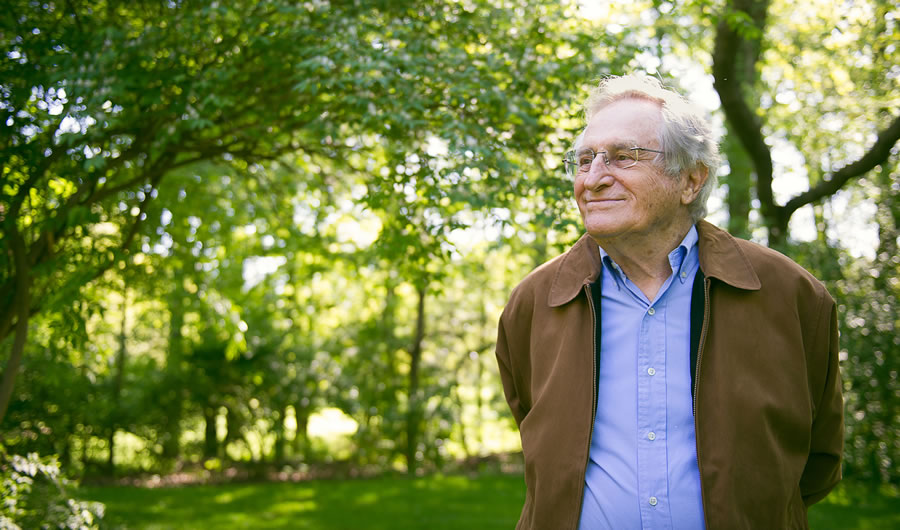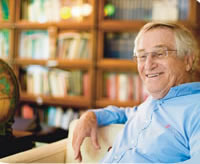Tired of Being Tired?
Rogel Cancer Center's Symptom Management and Supportive Care Clinic helps patients fight fatigue and other side effects of treatment

At 84, Emanuel Tanay is far too busy to be tired. A retired clinical professor of psychiatry at Wayne State University and well-known forensics psychiatrist, Tanay's diagnosis of metastatic prostate cancer seven years ago has by no means stopped him from doing what he enjoys. He continues teaching in the University of Michigan's Lifelong Learning program, is writing another book and does what he can to stay active.
Nevertheless, symptoms and side effects from his cancer and treatment have slowed him down.
Tanay's treatment has included extensive radiation, surgery and a drug called Lupron that eliminates testosterone and is often used to treat symptoms of prostate cancer. In addition to playing a key role in the development of male reproductive tissue, testosterone is related to energy and cognition. Without testosterone, simply put, fatigue sets in.
"My resilience is very low," says Tanay. "In other words, it takes very little for me to get exhausted. I can get started on my computer and, if something doesn't go right, the next thing I know . . . [feigns sleep]."
- Medication side effects
- Emotional distress
- Anemia
- Sleep issues
- Nutrition issues
- Co-morbidities
Cancer-related fatigue is defined by the National Comprehensive Cancer Network as a distressing, persistent, subjective sense of physical, emotional and/or cognitive tiredness or exhaustion related to cancer treatments that is not proportional to recent activity and interferes with usual functioning.
Fatigue is rarely an isolated symptom and is perceived by cancer patients to be one of the most distressing symptoms of cancer treatment.
"People's self-worth is often tied up in what they were doing before they had cancer," says Nurse Practitioner Suzette Walker, co-director of the University of Michigan Rogel Cancer Center's Symptom Management and Supportive Care Clinic. "Their sense of who they are is often their employment. When they're too tired, they feel like they're failing themselves and their families. It's a vicious circle of being tired and depressed as they seek a new normal."
In Tanay's case, fatigue has come with other side effects like difficulty walking and hot flashes. He visits the Symptom Management and Supportive Care Clinic around once a month for help.

"There is something I call 'emotional infection' you can transmit, and this group has it."
"There is something I call 'emotional infection' you can transmit, and this group has it," Tanay says. "They are such a benevolent group of people, so interested in your well-being. Whenever I go there, I feel somehow improved. I know someone has really put their mind to my distress."
Tanay has used medication and exercise to combat his fatigue, which is a direct result of the Lupron in his treatment program. Walker explains that factors such as anemia, low testosterone and thyroid issues are often identified and can be treated to help fatigue. If it truly is cancer fatigue, the clinic gets patients moving with walking and strengthening programs.
"In educating our patients about fatigue, the No. 1 thing is exercise," says Susan Urba, M.D., who co-directs the clinic with Walker. "Resting is not always the best and patients often don't know this. But just telling people to go out and exercise isn't very helpful. We get more specific, like telling a patient to walk to the mailbox and back every day. General conditioning can often be most effective in a formalized setting so we'll refer patients to physical therapy."
- Self-monitor your energy level.
- Limit naps so you can sleep at night.
- Structure routines.
- Use distractions like games, music or reading.
- Set priorities if you can't do everything.
- Postpone non-essential activities.
- Drink adequate fluids.
Tanay took part in physical therapy at Briarwood MedRehab and liked it so much he asked for a second referral. "One of the things that bothers me most is my inability to walk briskly," he says. "My physical therapy did help with flexibility and now I make an effort to walk outside, on my treadmill or at the rec center every day." He recently began a second round of physical therapy at the Geriatrics Center.
"I think almost every single person we've referred to physical therapy has benefited from it," Urba says. Other techniques used by the Symptom Management and Supportive Care Clinic to alleviate fatigue and other side effects include nutrition counseling, reviewing medications and ensuring healthy sleeping patterns. U-M resources are also available to help manage the significant emotional component of fatigue.
Walker says a person's entire sense of well-being improves with exercise, but Tanay adds that, for him, adrenalin plays a big part, too. The influx of energy he gets from teaching reminds him daily of the importance of keeping active and doing the things he loves.
